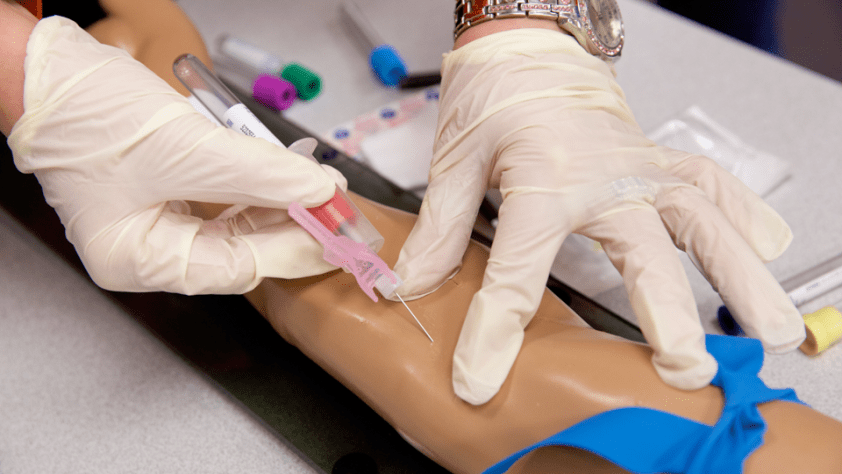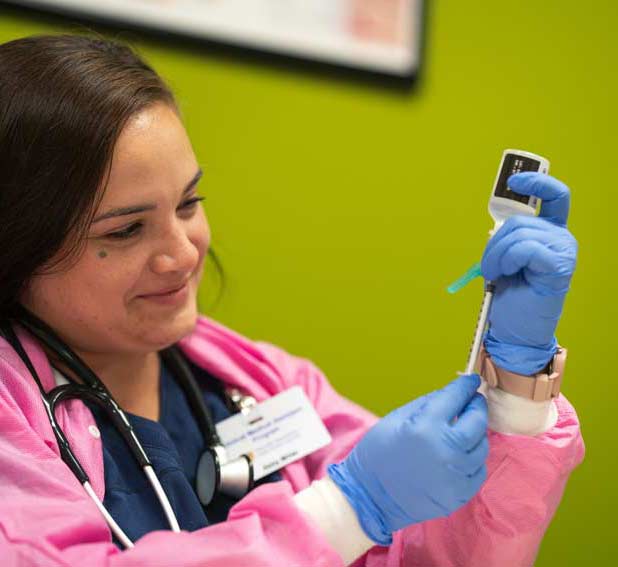The Course to Qualification: Comprehending the Phlebotomy Training Course Journey and Its Value
As you take into consideration the course to qualification in phlebotomy, it's important to understand the function you'll play in health care. Your training will cover important skills, from blood collection techniques to patient communication.

The Function of Phlebotomists in Healthcare
Phlebotomists play an essential role in the health care system, acting as the vital web link in between people and necessary analysis testing. You'll carry out blood draws, making sure samples are collected precisely and safely. Your expertise helps in identifying clinical problems, keeping an eye on health, and directing therapy decisions.
In your daily interactions, you'll need to establish count on with clients, making them really feel comfortable during what could be a demanding experience. You are accountable for classifying and dealing with samples very carefully to stop contamination or errors, which could influence examination results.
Yet, you'll typically work along with medical professionals and registered nurses, interacting vital details about clients' conditions. Your role is essential in maintaining the operations in medical care settings, making certain timely and precise outcomes. By grasping your abilities, you add meaningfully to client treatment, making you a crucial part of the medical group. Welcoming this duty is crucial to your success as a phlebotomist.
Summary of Phlebotomy Training Programs
When exploring phlebotomy training programs, you'll find various types developed to fit different timetables and discovering designs. Each program aids you develop vital abilities like blood collection and client communication. Comprehending these choices is key to choosing the appropriate course for your career.
Sorts Of Training Programs
Numerous sorts of training programs are readily available for those aiming to end up being skillful in phlebotomy. You can pick from certificate programs, which typically last a couple of months and concentrate on vital abilities. There are likewise diploma programs that provide a more detailed education and learning, commonly lasting as much as a year. If you're searching for a deeper understanding, an associate degree in an associated area could be the appropriate fit. On the internet training courses supply adaptability for those balancing job or household dedications, allowing you to study at your very own rate. In addition, some health centers and centers use on-the-job training programs, supplying functional experience while you find out. Whatever course you pick, each program aims to equip you with the essential skills for an effective phlebotomy profession.

Trick Abilities Established
Understanding phlebotomy calls for a collection of essential skills that are established with thorough training programs. You'll learn technical skills like appropriate capillary selection, needle insertion, and blood collection strategies. These hands-on techniques assure you can perform treatments safely and successfully. Furthermore, communication abilities are fundamental; you'll require to connect with patients, describe treatments, and put them secure. Comprehending makeup and physiology is critical, too, as it aids you situate veins and comprehend the body's feedback to blood draws. Lastly, you'll obtain knowledge of safety and security protocols and infection control, ensuring you preserve a sterile atmosphere. Each of these abilities is crucial for your success as a certified phlebotomist, making you a useful possession in any type of health care setting.
Trick Parts of a Phlebotomy Training Course
In a phlebotomy program, you'll concentrate on essential topics that lay the foundation for your future job. You'll take part in hands-on training that permits you to use what you have actually learned in real-world settings. Both the curriculum and functional experience are essential for your success as a phlebotomist.
Curriculum Overview
While seeking a phlebotomy training course, you'll run into a curriculum developed to outfit you with essential skills and understanding. Phlebotomy Training Course. This educational program generally includes anatomy and physiology, focusing on the circulatory system and understanding blood parts. You'll likewise learn around different kinds of blood collection techniques, consisting of venipuncture and capillary slit techniques
In addition, infection control and safety and security methods are crucial parts, guaranteeing you recognize just how to maintain a sterile atmosphere. You'll study patient communication, emphasizing communication and compassion, which are vital for reducing person anxiety. Moral and lawful considerations will certainly be resolved, preparing you for real-world duties. This foundational knowledge will certainly enable you to excel as a phlebotomist and offer quality care in professional settings.
Hands-On Training Experience
Getting hands-on experience is a vital component of your phlebotomy training course. This functional training enables you to use what you have actually discovered in a real-world setup, improving your abilities and confidence. You'll exercise venipuncture techniques, find out exactly how to manage find this various kinds of specimens, and get familiar with the tools used in the area. Under the advice of experienced instructors, you'll fine-tune your abilities, ensuring you're prepared for any type of circumstance you could face.
Additionally, you'll obtain the possibility to connect with patients, which is crucial for developing your interaction abilities. This combination of technical effectiveness and social skills is important for your success as a qualified phlebotomist. Inevitably, hands-on training is where concept satisfies technique, strengthening your knowledge and preparedness for accreditation.
Accreditation and Licensing Requirements
Prior to you can start your job in phlebotomy, it is vital to understand the accreditation and licensing needs that vary by state. The majority of states need phlebotomists to hold a qualification from a recognized company, such as the National Phlebotomy Organization or the American Culture for Scientific Pathology. These accreditations commonly involve passing an examination that checks your understanding and abilities in the field.
In addition to qualification, some states have certain licensing requirements. You might need to finish a specific variety of hours in professional practice, send proof of training, or undertake a history check. It is essential to investigate your state's guidelines to ensure you satisfy all necessary standards.
Staying educated about these demands not only assists you safeguard a setting yet likewise boosts your reliability as a professional. By satisfying these requirements, you'll be well on your way to a successful career in phlebotomy.
Hands-On Training and Practical Experience
Hands-on training and sensible experience are crucial parts of your phlebotomy education and learning, as they allow you to use academic knowledge in real-world circumstances. During your training, you'll involve in monitored venipuncture, find out appropriate methods, and end up being acquainted with various blood collection tools. This straight participation is crucial for developing your confidence and refining your abilities.
You'll function carefully with seasoned experts who can guide you through the nuances of patient interaction and sample handling. Each session not just strengthens your understanding but also prepares you for the busy atmosphere of health care setups.
In addition, several programs integrate scientific turnings, allowing you to experience varied setups, from hospitals to outpatient clinics. This exposure assists you adapt to different difficulties and patient requirements, ensuring you're well-prepared for your future duty. Welcome these possibilities, as they're important to becoming a qualified and thoughtful phlebotomist.
Obstacles Encountered Throughout Training
While getting hands-on experience is click site necessary, it is very important to acknowledge the obstacles that can occur throughout your phlebotomy training. You may encounter anxiousness when executing treatments on actual individuals, specifically if you're brand-new to the setting. The stress to obtain every little thing right can be overwhelming. Additionally, grasping the skills required for blood draws takes technique; you might deal with strategy at first.
Time management can likewise be a hurdle, as harmonizing theory, functional sessions, and personal commitments can really feel daunting. You might encounter varying learning rates amongst your peers, causing feelings of self-doubt if you assume you're falling back. Finally, adjusting to the various individualities of teachers can be challenging, as each may have an one-of-a-kind mentor design.
Recognizing these challenges beforehand can prepare you for success and assist you establish durability throughout your training journey.
Career Opportunities After Qualification

As you get experience, you might also consider specializing in locations like pediatric or geriatric phlebotomy, accommodating specific individual demands. Some phlebotomists pick to progress their occupations by becoming research laboratory specialists or going after more education and learning in medical care areas.
Furthermore, your accreditation can bring about functions in training or monitoring brand-new phlebotomists, enabling you to share your expertise. With the medical care industry constantly expanding, your abilities will certainly constantly be in demand, paving the way for a secure and meeting career. Accept the chances waiting for you!
Regularly Asked Questions
What Is the Regular Period of a Phlebotomy Training Course?
Phlebotomy training programs commonly last around 4 to 8 weeks. You'll involve in hands-on practice, classroom direction, and on the internet understanding. Completing this training prepares you for accreditation and a fulfilling job in medical care.
Are Online Phlebotomy Courses Available?
Yes, on-line phlebotomy training courses are readily available. They supply adaptability and benefit, enabling you to research at your very own rate. Just validate the program is accredited to meet qualification demands and gain important skills for your job.
How Much Does Phlebotomy Training Typically Cost?
Phlebotomy training generally costs between $700 and $2,500, depending on the program and area. You need to consider aspects like training course length, consisted of materials, and hands-on experience when selecting the right training for you.
What Prevail Requirements for Phlebotomy Training?
Typical prerequisites for phlebotomy training usually consist of a high school diploma or GED, immunizations, and a background check. Some programs might likewise require fundamental health care knowledge or qualifications, guaranteeing you're gotten ready for hands-on training.
Can I Work While Finishing My Phlebotomy Training?
Yes, you can work while completing your phlebotomy advice training. Several pupils balance work with their studies, but make specific to manage your time effectively to guarantee you satisfy both job and training dedications successfully.